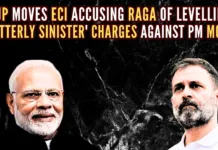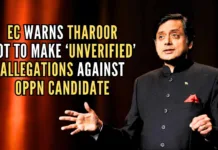
Kangana Ranaut evokes criticism over her statement on India’s Independence
Actress Kangana Ranaut has been under severe “secular” attack. The mother of anti-India and anti-Sanatan “secularism”, the Congress, has been using all kinds of epithets against her and asking the Narendra Modi Government to “take back the Padma Shri given to her recently”. Some of the “secularists” have even gone to the extent of calling her “seditious” and accused her of insulting “freedom fighters”. They have asked the government to book her on the charge of sedition.
What provoked the secularists, Indian-style to attack Kangana Ranaut right and left and demand stringent action against her? The statement she made on November 11 while addressing an event organized by a leading news channel, Times Now Navbharat. Her statement, inter-alia, read: “India’s independence in 1947 was not freedom but ‘bheek’ (alms). And we got real freedom in 2014”.
I agree that Kangana Ranaut used a few inappropriate words which she should have avoided. For example, she could have avoided the word “bheek”. However, to say so is not to suggest that she didn’t make a very valid point. She did make and it was based on true facts. She did call the bluff of the Congress, the perverted Indian Left, the JNU, the AMU, the DU, to mention only a few, which have been forcing down our throat distorted and biased history for decades. That’s the reason her candid statements rattled the “secularists” of all varieties.
That Kangana was absolutely correct could be seen from the fact that the UK had transferred sham power to J L Nehru and Congress in 1946 itself. It could also be seen from the fact that on August 15, 1947, Pakistan was created out of India exclusively for Muslims, India and Pakistan were granted dominion status that day within the British Empire with King George VI as the Emperor of India and Lord Mountbatten as the first Governor-General of India. And, both had an “allegiance to the Crown”.
Not just this, it could also be seen from the fact that on August 15, 1947, J L Nehru and other unelected Indians, overwhelmingly Congressmen, were administered the oath of office by Lord Mountbatten and the oath was in the name of the “British King-Emperor”. That UK was almost in full command even after August 15, 1947, could also be seen from the fact that British Field Marshal, who was leading the Indian Army before August 15, 1947, continued to lead the Indian Army even after August 15, 1947, and judges appointed by the British were not removed from our high courts and the federal court.
It needs to be underlined that India remained a dominion till January 26, 1950, when the Nehru-led government enforced the Indian Constitution. The Indian Constitution is almost a replica of the Government of India Act of 1935, which the British Parliament passed and the UK Government ruthlessly applied to further weaken India, promote separatism based on religious fanaticism and hurt the Hindus.
All this should vindicate Kangana Ranaut. Similarly, one may and may not endorse fully her claim that “we got real freedom in 2014”. But it’s a fact that India started getting freedom in 2014. It was only in May 2014 that the awakened Hindus comprehensively defeated Congress in the general elections. It was not only booted out of power but also reduced to the status of 44. So much so, they denied Congress the opportunity to even occupy the seat of Leader of Opposition in the Lok Sabha. The Hindus did the same to Congress in 2019. There are reasons to believe that things in under-threat India have started changing since 2014 and the Hindus may give a fillip to this trend taking into consideration the dangers facing the nation.
The whole point is that Kangana Ranaut could not be denounced for what she said. For, it’s a fact that the UK only transferred power to the Congress to mislead and hoodwink Indians, especially the Hindus.
The question to be asked is: Why is the Congress destroying India socially, culturally, economically, and politically; undermining the country’s democratic and Constitutional institutions; and weakening the Indian State itself? This is the question which most Hindus have been asking. The answer is simple and straight. The Congress was not founded by the Indians for achieving freedom from imperialist Great Britain, which started interfering in India and exploiting our natural resources through the canny, notorious, and barbarous East India Company in 1600 AD.
What happened in India between 1600 and 1857 in general and 1858 and 1885, in particular, is too well known to nationalistic students of Indian history and, hence, no need to recapitulate. Suffice to say that the British imperialists during this period devised and implemented policies calculated to consolidate and expand their rule in India; dividing the Indian society on caste and communal lines; playing one prince/ Nawab against the other; looting and plundering Indian resources and draining the Indian wealth; enriching the British economy; killing the indigenous Indian industry; pushing the outposts of the Empire further and further at the cost of the Indian exchequer; proving that their culture was superior, scientific and humane; conveying the feeling that the Indian culture and religion were responsible for the ills faced by the Indian society; creating a sense of inferiority complex among the Indians and inducing them to support the British in all matters; creating a class of loyalists among the Indians first in the shape of landlords and then the English educated Indians among the middle classes; and so on. To be more precise, they followed a policy of divide and rule, coupled with a policy of brutal repression and reward, to accomplish their designs in India.
They were successful. They ruled over India and exploited and persecuted the Indians with the help of the loyalists. Their whole policy was directed more by the British than by the Indian interests. All this ended the patience of Indians, barring the loyalists, and made them seethe with anger. By 1885, it had become clear to British imperialists and exploiters that the situation would go out of control anytime and it had become imperative to set up an organization in India with the help of English educated Indians so that they could avert the impending disaster before it was too late. The first initiative was taken by retired British civil servant Allan Octavian Hume. According to Sir William Wedderburn, Hume’s colleague and biographer, and Lala Lajpat Rai of Punjab, the reason that prompted Hume to establish an organization was his “anxiety to save India from disruption”. Wedderburn, who became the first chairman of the British Committee of the Indian National Congress, formed in 1889 in London, and remained in that post till the end of his life, candidly acknowledged that Hume knew that the “existing government administered by foreign officials on autocratic lines was dangerously out of touch with the people” and “there was an imminent danger of a violent revolt which might endanger British rule in India”.
It bears recalling that Hume had worked in Assam as District Collector for years and he knew what was going on beneath the surface. Anxious, alarmed, and religiously committed to London as he was, Hume first held discussions with the then Conservative Governor-General and Viceroy of India Lord Dufferin and then Conservative Secretary of State for India and Marquess of Salisbury Lord Randolph Churchill. Hume’s views were appreciated and he was given a free hand to take the required steps. His efforts succeeded in roping 72 English educated Indians, lawyers, nawabs, etc hailing from different parts of the country and the result was the foundation of the Indian National Congress in December 1885 at Bombay (now Mumbai). The clear objective was to puncture and defeat the ongoing Indian freedom struggle against the British with the help of some “influential” and “moderate” western-educated Indians like W C Bonnerjee, who believed in the “British sense of justice”. Bonnerjee presided over the first session of the Congress.
Between 1885 and 1947, Congress served as a “safety valve” for the Indian discontent. It was no more than an “annual forum” whose deliberations were given what certain leading historians call “exaggerated significance”. Indeed, there were leaders in the Congress who were genuinely committed to the cause of the country, but they were just odd faces in the party whose views were never considered. Take, for example, Lokmanya Bal Gangadhar Tilak, Sri Aurobindo Ghose, Bepin Chandra Pal, Lala Lajpat Rai, who represented “new Spirit”, and Subhas Chandra Bose and their fate. Those who controlled the Congress organization did not allow these great leaders to influence the Congress’s policy, which they rightly termed as ‘policy of political mendicancy’. The Congress split at Surat (Gujarat) in 1907 was the immediate fall-out of a conflict between the British-guided official Congress and nationalists like Bal, Pal, and Lal.
Earlier, in December 1905, when tempers were running high in the country following the partition of Bengal, President of the Benaras Congress Gopal Krishna Gokhale said while delivering his Presidential address: “For better, for worse, our destinies are now linked are now linked with those of England and the Congress freely recognizes that whatever advance we seek must be within the empire itself”. A year later in Calcutta, the Congress under the presidentship of Dadabhai Naoroji subverted the whole Swadeshi Movement. Naoroji, who was elected to the House of Commons as a Liberal candidate from Central Finsbury in 1892, was imported from London to do the dirty job.
As for Bose, he left the Congress in 1939 to found Forward Block so that he could fight for the independence of India the way he liked. He left Congress because he defeated M K Gandhi’s candidate Pattabhi Sitaramayya in the 1939 Presidential election. Bose had won the election for the second time in a row hands down and commenting on the defeat of Sitaramayya, Gandhi had said: “Sitaramayya’s defeat was my personal defeat”. Earlier in December 1928 in Calcutta (now Kolkata), Gandhi and the loyalists had opposed Subhas’s amendment to Motilal Nehru report’s Dominion Status goal and called for “immediate reiteration of the complete independence objective”.
The Congress under the leadership and guidance of Gandhi did engineer three movements – Non-cooperation Movement (1920-February 1922), Civil Disobedience Movement (1930-1934) and Quit India Movement (1942), but all ended in a fiasco because the Congress leadership never wanted to take things too far. In February 1922, Gandhi unilaterally withdrew the Non-cooperation Movement on the ground that an Army pensioner Bhagwan Ahir and his associates burned alive 22 policemen in the police station at Chauri Chaura, Gorakhpur. Ahir and his associates were not Congressmen. Nor were they part of the Non-cooperation Movement. They had taken recourse to violence after the police had beaten up Ahir and then opened fire indiscriminately on the people who had come to lodge a strong protest in front of the police station. Gandhi dumbfounded the nation by withdrawing the movement at a time when the people had brought the British Government to its knees and it appeared that freedom was round-the-corner.
The Civil Disobedience Movement, which was started with much fanfare with Gandhi as its leader to attain Puran Swaraj also ended in a complete failure, notwithstanding the fact that people made supreme sacrifices for the cause of Puran Swaraj. But the Congress under Gandhi took no time in changing the goal post. In fact, Gandhi just gave an 11-point memorandum to Governor-General Lord Irwin which did not demand any change in the existing politico-constitutional structure, not even Dominion Status.
Remember, between 1928 and 1929, Gandhi had opposed those calling for another round of all-India mass struggle aimed explicitly at complete political emancipation. Gandhi rejected outright the “snap independence resolution”, which was been passed in his absence at the Madras session of the Congress in December 1927, and in Calcutta in December 1928, Gandhi pushed through a “compromise formula” that accepted the Dominion Status objective provided London granted it by the end of 1929, failing which the Congress would be within its right to start Civil Disobedience for attaining Puran Swaraj.
The fact of the matter is that the Civil Disobedience Movement did not achieve anything for India in the real sense of the term. India only got the Government of India Act 1935 which even a liberal like C Y Chintamani described as the ‘anti-India Act’. As for the Quit India Movement, which was started in August, the less said the better. The common people did make a splendid contribution to the movement ignoring the threat to their life and limb for the cause but the movement led India nowhere. The British defeated the half-hearted movement without much difficulty in just five months and London did not face any real political challenge from the Congress till August 15, 1947, when the British quit India not because the Congress did anything great but because of three other factors – pressure from below in India and sacrifices made by non-Congressmen and women, international situation and the internal situation in England. It would not be out of place to mention here that Gandhi had declared in 1940 that “we do not seek our independence out of Britain’s ruins”. He made this statement in the wake of the Second World War which started in 1939. Gandhi’s line was inconsistent with the line of Bose who wanted to strike as England was involved in the war elsewhere and the iron was hot.
In between, Congress signed a pact with the Muslim League at Lucknow in 1916 (Lucknow Pact) to grant a separate electorate to the Muslims and “bolstered” the Khilafat Movement under the leadership of M K Gandhi between 1919 and 1922. The objective was to “salvage the Ottoman caliph as a symbol of unity among the Muslim community in India”.
These constitute only a few of the several such instances which serve to demonstrate that, on the one hand, the Congress served as a tool of subversion of the Indian polity, and, on the other, promoted Muslim separatism. All this should prove that Congress never ever challenged England. On the contrary, it acted in a manner that always helped the British. Just compare the British social, economic, religious, and political policies evolved in England and implemented in India with the policies devised and implemented by the Sonia Congress-led UPA and you would find no fundamental difference between them. In fact, the Congress and the Congress-led Governments at the Centre caused more damage to Indian polity, society, and economy as compared to the damage England caused to India between 1600 and 1947.
It’s good that Kangana Ranaut said what she said about Indian freedom. It has triggered an interesting debate with all nationalists hailing her. It’s hoped the Narendra Modi Government would appreciate what she said. It would do well to underline that the Hindus will appreciate the custodians of the Indian State from the core of their heart the day Indian Constitution and educational, justice, and police systems are Indianised; India declared Sanatan Rashtra and Sanatan Dharma declared state religion. The sooner it is done, the better.
Note:
1. Text in Blue points to additional data on the topic.
2. The views expressed here are those of the author and do not necessarily represent or reflect the views of PGurus.
PGurus is now on Telegram. Click here to join our channel and stay updated with all the latest news and views
For all the latest updates, download PGurus App.
- ‘Kashmir My core constituency’: Revisiting July 12, 2003 to understand politics, Omar Abdullah-style - March 15, 2024
- Total deviation from traditional approach: Seven takeaways from PM Modi’s March 7 Srinagar visit - March 9, 2024
- Status of political parties: Why is further J&K reorganization imperative? - March 1, 2024











[…] source […]
Very nicely written article. Hope this article initiates debate in today’s society.
A great sage in South India is supposed to have said when someone informed about India getting freedom -‘Good. Now that we are free, we have to start becoming independent’ or words to that effect!
I agree with Kangana. The first collective sense of independence was displayed in 2014.
Irrespective of the contents, if what Mr. Khurshid opines is freedom of expression the opinion of Ms. Kangana must also fall under the freedom of expression.
Sir, your article itself is misquoting. “all nationalist hails kangana”. you are defending kangana only to degrade congress. this article don’t have proper head and tail. you have stated from freedom and ended in sonia gandi, congress etc. Congress of those days represented whole of india. Then the word ‘bheek’ is applied to all the martyred of india.
tell me one thing if tomorrow BJP looses election and congress/ghatbandan comes to power would you call the situation as ‘india lost its freedom’ ? and the second thing is many regiments of indian army are created by british, would you call that also as a bheek ? This arrogance of right wing will bring down modi soon.
How is it possible to degrade the degraded?
Nehru’s allegiance was to the British and Islamicists
The Mountbatten papers, his letters , his diary will show Nehru’s and MK Gandhi’s complicity with the Islamicist and the british colonialists
Why do you not petition for their release?
Cingress does not want them made public
Thye betrayed our nation